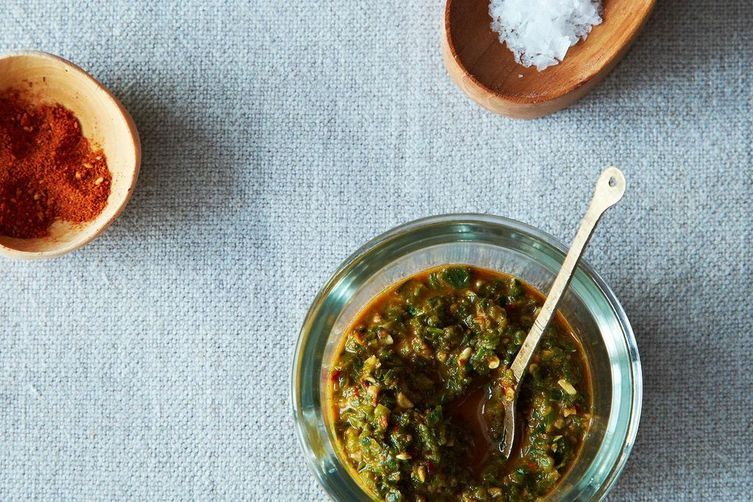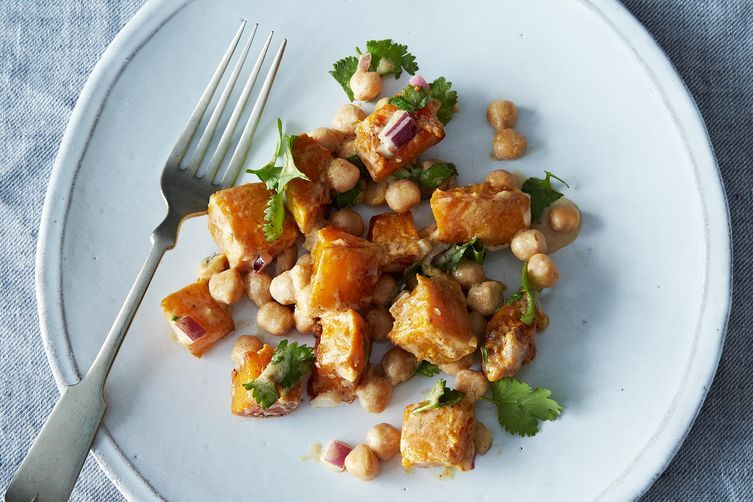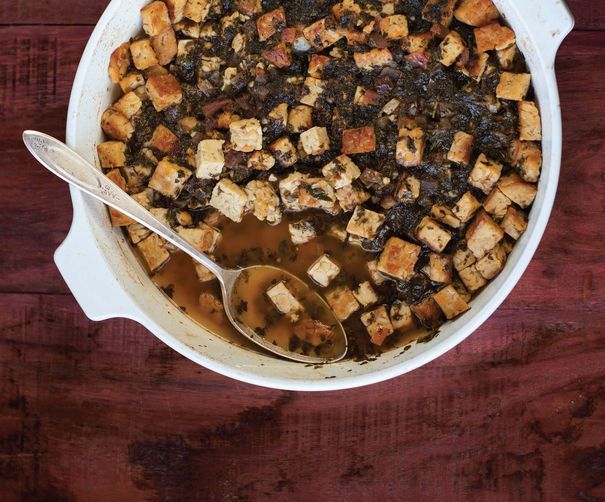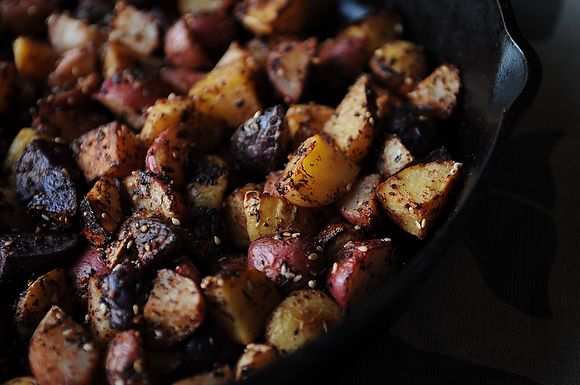We're sitting down with our favorite writers and cooks to talk about their upcoming cookbooks, their best food memories, and just about anything else.
Today: We join Bryant Terry, food activist and author of Afro-Vegan, on a global journey -- from the farthest corner of Nigeria to his childhood home in Tennessee.

In his first two books, Vegan Soul Kitchen and The Inspired Vegan, Bryant Terry showed us the sustainable side of soul food and reminded us that veganism can be both fearless and flavorful. His newest volume, Afro-Vegan, reclaims the broad culinary heritage behind it all, journeying as far as Zimbabwe and as close to home as New Orleans. And then, Terry serves up the remix.
Borrowing heavily from the African continent and the Caribbean, from Cajun cuisine and his own memory of the Deep South, Terry offers a hundred recipes that are at once familiar and unlike any we’ve ever seen. You’ll find a wheat berry salad taking on the Moroccan tagine, and Ethiopian berbere mingling with a black-eyed pea slider.
Woven into its pages is a running soundtrack of music selections, together with cinematic, literary, and political musings that span continents and generations. The cookbook reads, ultimately, like an ode to the Afro-Vegan experience -- to snacking on Nigerian akara with Marcus Samuelsson’s Yes, Chef in hand, to gathering for sweet corn soup with Miles Davis playing in the background. It is an invitation to dine together with a global community -- and when you turn the page, there’s no telling where in the world you might end up.
Throughout Afro-Vegan, you offer readers a soundtrack to cook and dine by. Why was it important to pair your recipes with music, books, and films?
Since I started writing cookbooks, I have encouraged people to not only procure food from local sources and cook it from scratch (while listening to good music), but also to build community around the table, discussing things that move them. I hope that the music, books, and films that I put forward inspire people to do all those things. I also use the suggested cultural matter to enlighten people about important issues. For example, for my Jamaican Patties Stuffed with Maque Choux, I suggest the documentary film Life and Debt as a way to educate readers about the impact of economic globalization on Jamaica and other Caribbean countries.
In your introduction, you emphasize the importance of building community around the table from a young age. What is your favorite childhood food memory?
Spending time in my paternal grandfather’s backyard garden in Memphis. I won’t over-romanticize it because planting, tending, harvesting, shelling, and shucking was hard work. But spending summers with my grandparents and having garden-fresh food that I played a part in producing paid off in yummy meals and happy memories.
What advice would you give to an omnivore delving into Afro-Vegan cuisine for the first time? Any good recipes to start with?
One of the most important lessons that I try to impart is that we need to listen to our bodies and consider a number of factors when deciding what we should eat for better health and well-being: bodily constitution, health status, geographic location, the current season, what’s available locally, what our ancestors ate, and the like. I keep a food journal a few times a year, documenting what I am eating and how those foods are making me feel. From there I decide what I should continue eating and what I should avoid. As for Afro-Vegan recipes, I would start with the Coconut Butter-Teff Biscuits with Sweet Plantain Spread, All-Green Spring Slaw, Za’atar-Roasted Red Potatoes, and the Sweet Potato and Lima Bean Tagine.
More: Spice up your life with our 10 Essential Spices. 
At the end of your book, culinary historian Michael W. Twitty shares his tips for starting an Afro-Vegan garden. What’s in your own?
In the spirit of unifying our two cultures, my wife and I have been developing what we call Afro-Asian cuisine since we first started dating. We remix the staples, flavor profiles, and classic dishes of the African and Asian Diasporas to create new and exciting home-cooked meals, and it is really important for us to ensure that our daughter is connected to a diverse selection of cultural foods. So we grow a wide variety of fruits, vegetables, and herbs at our home to buttress those efforts. We have persimmon, fig, Meyer lemon, and kumquat trees, and we just planted watermelon starts. In our two 100-square-foot raised beds we are growing 5 varieties of mustard greens, kale, collards, bok choy, Japanese eggplant, and four varieties of cucumbers. We also have a whole 5 x 7 bed and several pots in which we are growing over a dozen herbs.
When you’re craving a midnight snack, which Afro-Vegan recipe do you flip to first?
Creole-Spiced Plantain Chips -- they are a great snack when you have the munchies.

Serves 8 to 12 as hors d'oeuvre, 4 to 6 as main dish
6 tablespoons extra-virgin olive oil
1 pound tempeh, cut into 1/2-inch cubes
2 cups vegetable stock
1 1/2 cups Chermoula (see below)
1/2 teaspoon coarse sea salt
For the Chermoula:
3 tablespoons extra-virgin olive oil
1/2 cup finely chopped red onion
1 teaspoon coarse sea salt
3 large cloves garlic, minced
1 1/2 teaspoons cumin seeds, toasted and ground
1/2 teaspoon paprika
1/4 teaspoon freshly ground black pepper
1/8 teaspoon cayenne pepper
3 tablespoons freshly squeezed lemon juice
1 tablespoon freshly squeezed orange juice
2 tablespoons water
1/4 teaspoon seeded and minced habanero chiles
A pinch of saffron threads, crumbled
1 1/2 cups packed minced cilantro
1/2 cup packed minced flat-leaf parsley
See the full recipe (and save and print it) here.
Photo of Bryant Terry by Paige Green; potatoes by Sarah Shatz; tempeh by Paige Green; all other photos by James Ransom

On Black & Highly Flavored, co-hosts Derek Kirk and Tamara Celeste shine a light on the need-to-know movers and shakers of our food & beverage industry.
Listen Now



See what other Food52 readers are saying.